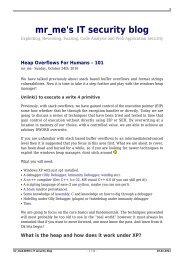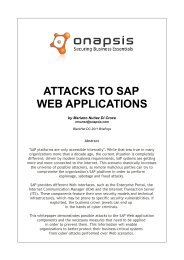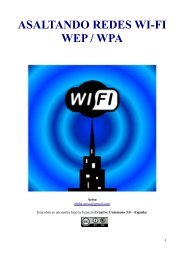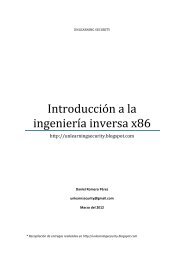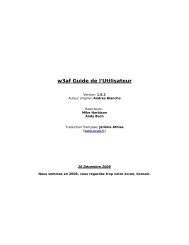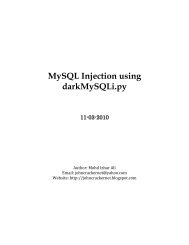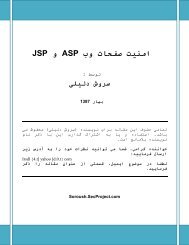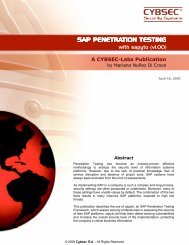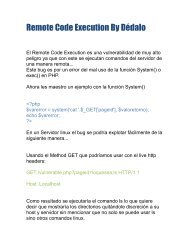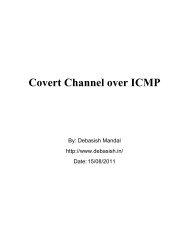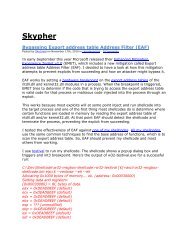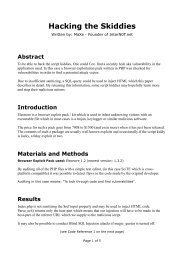prin#() tricks - Intelligent Exploit
prin#() tricks - Intelligent Exploit
prin#() tricks - Intelligent Exploit
Create successful ePaper yourself
Turn your PDF publications into a flip-book with our unique Google optimized e-Paper software.
prin'() <strong>tricks</strong> <br />
DC4420 slides, Feb 2012 <br />
1
Who am I <br />
• Shaun Colley <br />
• Senior Security Consultant at IOAcFve <br />
• <strong>Exploit</strong> development, reverse engineering, <br />
development, pen-‐tesFng <br />
2
Prin'() <strong>tricks</strong> -‐ Agenda <br />
• ShiMing the stack pointer & arbitrary <br />
mem writes… <br />
• … in order to exploit format string bugs <br />
without %n <br />
• When is a NULL pointer not just a NULL <br />
pointer <br />
• …don’t expect prin'() & family to crash on <br />
NULL pointers <br />
• These are just a few things I played with a <br />
while back
• There was a good article in Phrack #67 called “A<br />
Eulogy for format strings” (phrack.org/issues.html<br />
issue=67&id=9) by Captain Planet <br />
• Main point of the article was disabling the antiformat<br />
string bug exploitation measures<br />
implemented by the FORTIFY_SOURCE patch (gcc<br />
prog.c –o prog -D_FORTIFY_SOURCE=2) <br />
• The patch’s anti-exploit measures are: <br />
• Detect ‘holes’ in direct parameter access, i.e.<br />
%16$x and not %16$x %15$x %14$x … %1$x<br />
• Detect %n in format strings that are in writable<br />
segments (stack, heap, BSS, …) <br />
4 <br />
• Both of these result in an abort()
• How did the author, Captain Planet <br />
disable FORTIFY_SOURCE <br />
• Need to look into the GLIBC vfprin'.c <br />
source code... <br />
• Warning – it’s not preby. In fact <br />
understanding the code is more of a <br />
reverse engineering job than just <br />
reading C code J <br />
See code on next slide… <br />
5
args_type = alloca (nargs * sizeof (int)); // !!! UNBOUNDED ALLOCA = STACK<br />
SHIFTING !!! <br />
memset (args_type, s->_flags2 & _IO_FLAGS2_FORTIFY '\xff' : '\0', <br />
nargs * sizeof (int)); <br />
args_value = alloca (nargs * sizeof (union printf_arg)); // !! UNBOUNDED STACK<br />
SHIFTING !!! <br />
/* XXX Could do sanity check here: If any element in ARGS_TYPE is <br />
still zero after this loop, format is invalid. For now we <br />
simply use 0 as the value. */ <br />
/* Fill in the types of all the arguments. */ <br />
for (cnt = 0; cnt < nspecs; ++cnt) <br />
{ <br />
/* If the width is determined by an argument this is an int. */ <br />
if (specs[cnt].width_arg != -1) <br />
args_type[specs[cnt].width_arg] = PA_INT; // UNBOUNDED NULL DWORD WRITE <br />
6
• Nargs = maximum possible number of format args, i.e. <br />
%10$x %12345$x would give nargs = 12345 <br />
• And specs[cnt].width_arg = width of currently parsing <br />
format specifier <br />
• So args_type[specs[cnt].width_arg] = PA_INT; can<br />
ultimately lead to an (almost-)arbitrary addr NULL<br />
DWORD write <br />
7
• This allowed the author to toggle off the <br />
_IO_FLAGS2_FORTIFY flag in the file stream being <br />
used. <br />
• Very important point to note is that nargs was set to <br />
something that would wrap to 0 in the memset, i.e. <br />
%1073741824$ <br />
• And then another format specifier was used to exploit <br />
args_type[specs[cnt].width_arg] = PA_INT <br />
• If width_arg is chosen very carefully the <br />
FORTIFY_SOURCE flag in the file stream is NULLed. <br />
• At this point you can use direct parameter access + <br />
%n’s to carry out a fairly standard format string aback <br />
8
• Cool, patch bypassed… <br />
• But are there any other ways to exploit this arbitrary <br />
stack pointer shiM and/or arbitrary NULL dword <br />
write <br />
• For example, without later having to use %n like in <br />
normal format string exploits <br />
• Yes, but they’re fairly applicaFon-‐specific. Let’s <br />
consider each of the aback vectors -‐ 1) stack shiMing <br />
and 2) arbitrary address write (not arbitrary value) <br />
9
• Stack pointer shiMing with alloca()… <br />
• Few different possibiliFes. Firstly you could use a large <br />
DPA to shiM the stack pointer into the heap: <br />
args_type = alloca (nargs * sizeof (int)); // !!! UNBOUNDED ALLOCA =<br />
STACK SHIFTING !!! <br />
memset (args_type, s->_flags2 & _IO_FLAGS2_FORTIFY '\xff' : '\0', <br />
nargs * sizeof (int)); <br />
• However you’ll generally get a SIGSEGV because of the <br />
memset() <br />
10
• SomeFmes this doesn’t maber <br />
• The memset has sFll corrupted memory up to the point a <br />
guard page is hit… <br />
• We just need some of this memory to be used in a SEGV <br />
signal handler <br />
• i.e. SEGV signal handler tries to drop privileges to do <br />
something priv-‐sensiFve but the saved UID has been <br />
overwriben with 0’s… <br />
• Could be preby bad news. <br />
• Demo (on a VM!!) <br />
11
• What if there is no signal handler and a seg fault in memset() <br />
will just crash the app <br />
• SomeFmes we may be able to work it so that nargs * sizeof(int) <br />
at [1] is small enough that no page fault happens at memset()… <br />
args_type = alloca (nargs * sizeof (int)); // !!! [1] UNBOUNDED<br />
ALLOCA = STACK SHIFTING !!! <br />
memset (args_type, s->_flags2 & _IO_FLAGS2_FORTIFY <br />
'\xff' : '\0’,nargs * sizeof (int));<br />
args_value = alloca (nargs * sizeof (union printf_arg)); // [2] <br />
• Yet at the same Fme we make nargs * sizeof(union prin'_arg) <br />
is large enough to shiM the stack pointer past the guard page <br />
and into the heap <br />
12
• So we use a %$x with number small enough that<br />
* sizeof(int) still leaves ESP in the stack therefore<br />
the memset() doesn’t page fault… <br />
• .. Then the next alloca() with no annoying memset() shifts the<br />
stack pointer past the guard page and into an area of<br />
memory we (in/)directly control i.e. heap <br />
• Any further function calls after this point will push stack<br />
frames into this memory area <br />
• What if another (p)thread then clobbers this area with data<br />
we control <br />
• You’ve potentially got an exploitable vector…and you didn’t<br />
even use a %n specifier <br />
• You just need to find somewhere you can shift to that you<br />
have some control over <br />
13
• Can be a little messy <br />
• Often need to play around with rlimits and<br />
get a lot of heap malloc()’ed <br />
• Demo… <br />
14
• What about using the arbitrary NULL overwrite for<br />
something <br />
• Again, application-specific just like the first demo <br />
• Could be used to zero out some context-specific int<br />
like Captain Planet used to zero out the<br />
FORTIFY_SOURCE flag <br />
• There are these assignment ops as well: <br />
15 <br />
If case 1:<br />
/* One argument; we already have the type. */ <br />
args_type[specs[cnt].data_arg] = specs[cnt].data_arg_type; <br />
break; <br />
default: <br />
/* We have more than one argument for this format spec. <br />
We must call the arginfo function again to determine <br />
all the types. */ <br />
(void) (*__printf_arginfo_table[specs[cnt].info.spec]) <br />
(&specs[cnt].info, <br />
specs[cnt].ndata_args, &args_type[specs[cnt].data_arg]);
• Be imaginative and do some digging – there may<br />
be something you can overwrite that will be<br />
enough to affect execution flow in your favour <br />
• Application-specific privilege flags <br />
• Loop counters <br />
• i.e. overwrite a decrementing loop counter<br />
with zero, then… <br />
• counter--;<br />
à 0xffffffff <br />
• Could lead to memory corruption <br />
16 <br />
• …
• Lastly, be aware that printf(“abcd %s\n”, NULL) does not<br />
necessarily crash at a NULL pointer dereference <br />
• According to C99, the behavior is actually undefined <br />
• But glibc’s *printf() and other implementations will<br />
replace such an occurance with “(null)” (not always,<br />
sometimes it will seg fault – it depends what else is in the<br />
format string) <br />
• i.e.<br />
• root@bt:~# ./null<br />
• abcd (null)<br />
17
• Potential to be abused<br />
• Again, application-specific but could lead to an overflow in<br />
sprintf() if ptr was supposed to point to a string shorter than<br />
strlen(“(null)”) = 6 bytes. <br />
• i.e. char *ptr = NULL; <br />
• switch(user_controlled_int) { <br />
case 0 : ptr = “AB1”;<br />
break; <br />
18 <br />
} <br />
case 1 : ptr = “AB2”; <br />
break; <br />
case 2 : ptr = “AB3”; <br />
break; <br />
sprintf(buf, “abcd %s”, ptr); // could be an overflow
• Just some *printf() internals/<strong>tricks</strong> I thought might be<br />
interesting. <br />
• Thanks for listening. <br />
Questions <br />
IOAcFve, Ltd <br />
www.ioacFve.co.uk <br />
scolley@ioacFve.co.uk <br />
19



